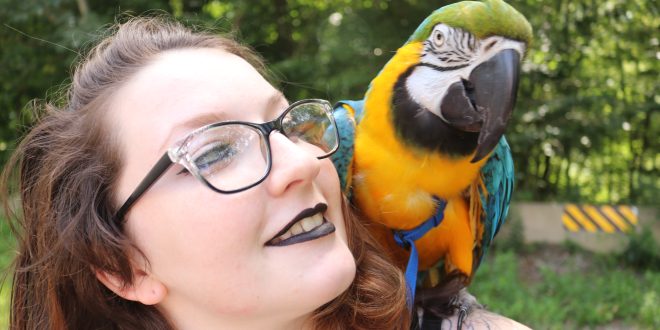TORRINGTON, CT – When avid motorcyclist Thea Everest of Torrington indulges in what’s commonly referred to as “wind therapy” by many riders, she often takes along a passenger who can literally spread his wings in the breeze as they roll down the byways.
Rather than occupy the normal pillion position behind the operator, though, Kaiba sits on one of her shoulders; strapped into a harness and tethered to her belt. Kaiba is a blue and gold, motorcycle-riding macaw who is half of Everest’s age. She is 24 years old, while he is approximately 12.
See the macaw out riding in this YouTube video…
—
RIDE-CT first spotted the duo a few weeks ago when they rode into the Torringford Volunteer Fire Department’s downtown car show on Everest’s 2013 Honda Sabre cruiser. Their arrival drew incredulous looks from spectators.
A couple of nights later, they were spotted again; this time sans motorcycle getting ice cream at Carvel. It was a serendipitous signal that a column on Kaiba and her keeper was warranted.
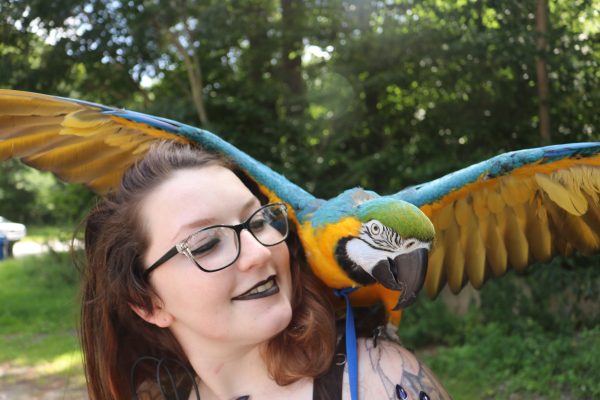
Of course, they rode to the meet-up spot. “I’ve been riding for four years but when I first got him, he was terrified of everything, so he’s only been riding maybe for about two, three,” said Everest last Saturday morning. She then proceeded to tell how she obtained Kaiba on June 1, 2020 from a woman who rescued the colorful bird from what she believes was an abusive situation.
“Based on his reaction to hands when I first got him, he was, I would say (abused),” Everest said. “You try to touch him, he would have bit your finger off. As far as I can tell, maybe he was hit, maybe he was kept in the dark. I don’t know, but he had ripped out all his feathers on his chest when I first got him.”
A bare patch on his chest suggested the level of his fear and misery. “As he got happier with me, they started growing back in. He wasn’t picking them out,” she said, noting that “feather plucking is a sign of depression in birds. Whatever he went through, he went through a lot.”
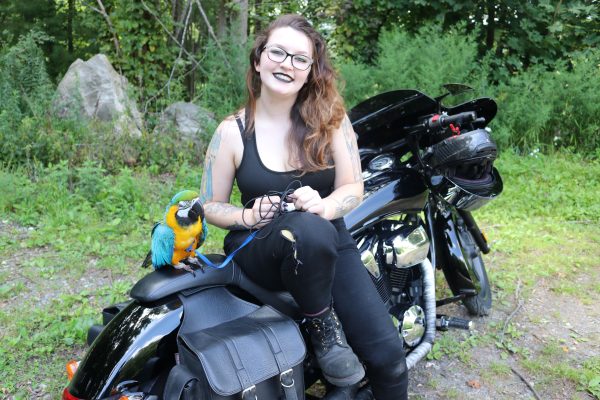
Macaws are primarily native to Central and South American and are classified as a species of New World parrot. All macaws are parrots, but not all parrots are macaws, and they can make affectionate and loyal pets.
Normalizing Kaiba has been a process for Everest. His wings had been clipped before she got him, so he wasn’t able to fly. “His wings started coming in, so I started teaching him how to fly,” she said. She also started taking him along on bicycle rides before graduating to the 2015 Honda CBR 300R sport bike that was her first motorcycle.
“He seems to like it. He’s not stressed ever with it. I just think birds are meant to fly, so, why not?” Everest said, recalling that her starter bike “was fun to learn on but I outgrew it in about six months and then I got my (Honda CBR) 600RR.”
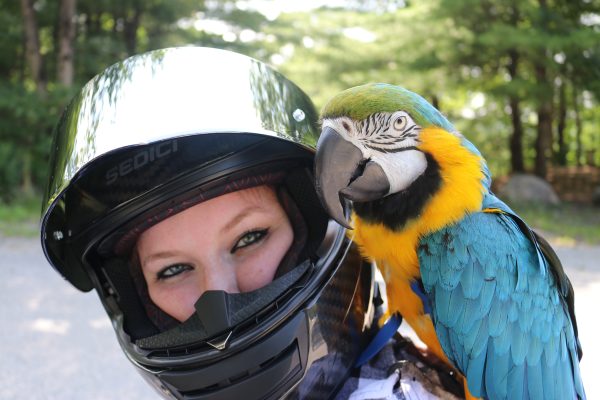
In the three years since getting the CBR600RR, she’s put about 40,000 miles on the odometer. Unfortunately, it now has a battered front end. “In May, I was in accident. I low-sided in a turn. There was dirt in the road. I missed it. It was a bad accident. I was out of work for a while,” she said.
Everest is careful when riding with Kaiba and makes adjustments to accommodate her passenger. “No highway ever. I keep my speeds below 40. In the wild, birds fly anywhere from 10 to 50 miles an hour. There’s a big range that they fly at, but I keep 40 at the max,” she said.
Everest also keeps the visor on her full-face helmet open at all times “so he can see my face, and he doesn’t like gloves so I have open tip gloves so he can still see my hands.”
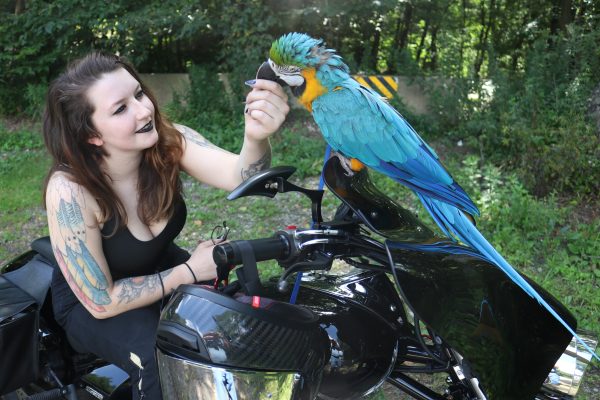
Just like a pet dog who gets excited or wants to come along when its owner heads to the door, Kaiba also reacts. “When he knows I’m going for a ride, he sees me putting on my helmet, often times he gets upset ’cause he knows that it means I’m leaving the house,” Everest said.
Unlike most macaws, and perhaps because of being mistreated when he was younger, Kaiba isn’t especially verbal. During the meet-up, he contentedly sat on Everest’s motorcycle, occasionally cracking and eating walnuts. He later let me hold him, responded to a prompt for a high five, and even provided a kiss on the cheek.
“It’s weird. He’s very quiet for a macaw. He does talk. He mutters more. His speech isn’t very clear at times. The past two year he’s gotten much louder, though. He does talk now. He does yell sometimes.” And he does repeats what he’s heard. “He definitely swears at me. He’s definitely picked up my bad vocabulary,” Everest said.
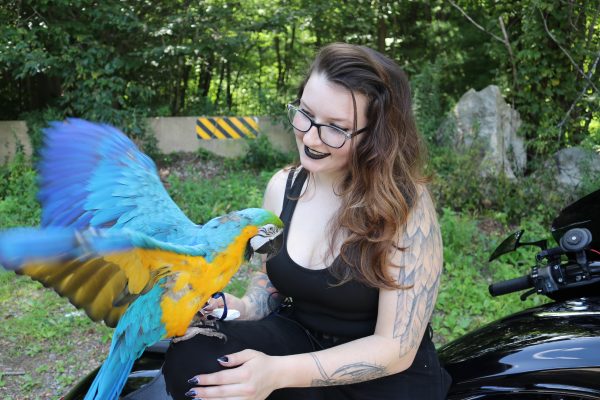
Cognizant that macaws are used to a warmer clime, Everest only takes Kiaba riding in summertime. “Maybe once a week. Maybe more. I don’t try to like take him every day. I don’t think he needs to be on the motorcycle every day. Motorcycling is dangerous enough as it is,” she said.
Everest is somewhat dumbfounded by some of the questions she gets when she’s out with her avian sidekick. “Unfortunately, they’re not the smartest questions. ‘Is that a real bird?’ That’s my most commonly asked question; the first thing people say.”
Others “don’t really know what to say. They’re like, ‘How does he hold on?’ ‘Does he just fly next to you?’ That’s another common one. Obviously not. He sits on my shoulder.”
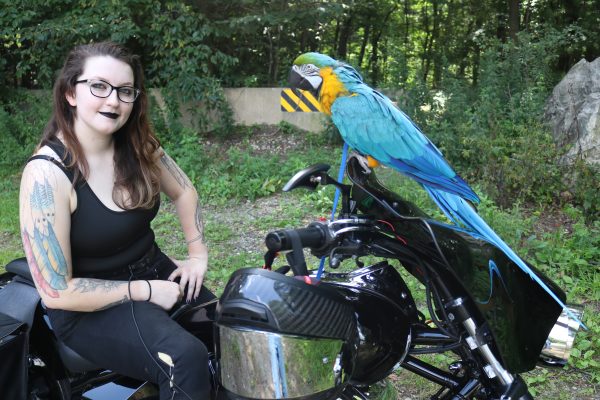
As any rider will tell you, wind therapy inevitably clears the mind and improves the mood. Perhaps riding, but more likely Everest’s love and patience, has had the same impact on Kaiba.
“Three years ago, you wouldn’t have been able to touch him. You wouldn’t have been able to get near him. I could barely put this on him,” she said, holding up his harness as she stood with Kaiba beside her motorcycle. “Now, as you see, he’s a changed bird, and he’s happy, and that’s all that matters to me.”
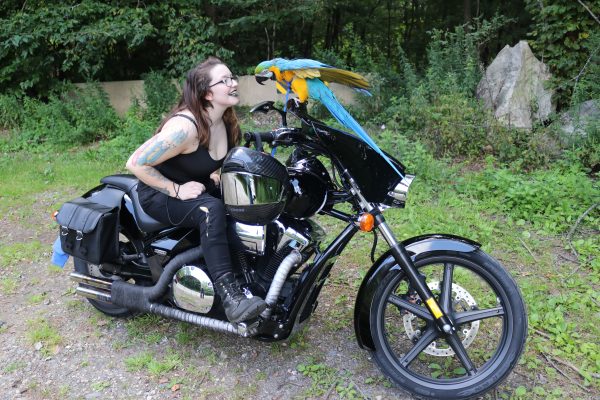
(Photos by Bud Wilkinson)
 Ride CT & Ride New England Serving New England, NYC and The Hudson Valley!
Ride CT & Ride New England Serving New England, NYC and The Hudson Valley!

